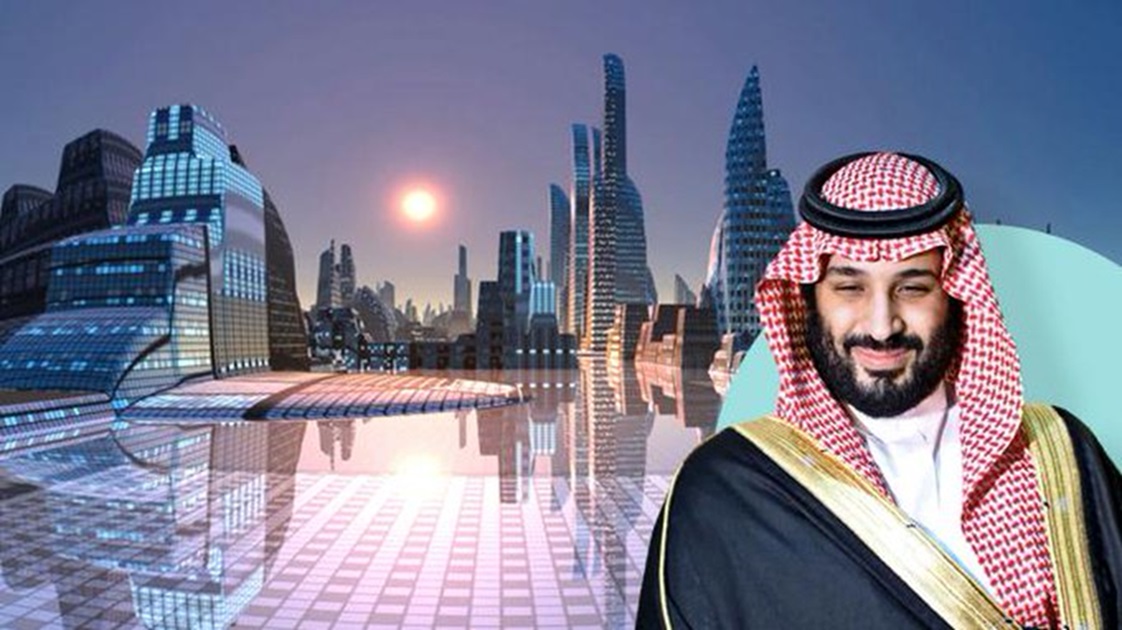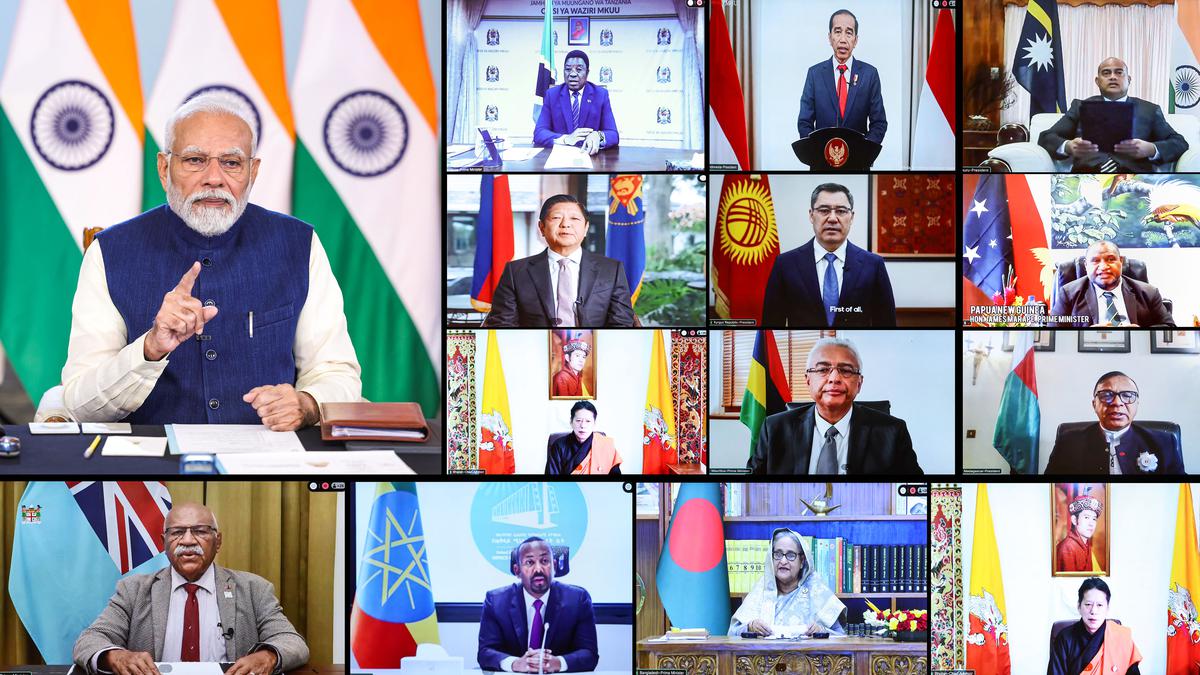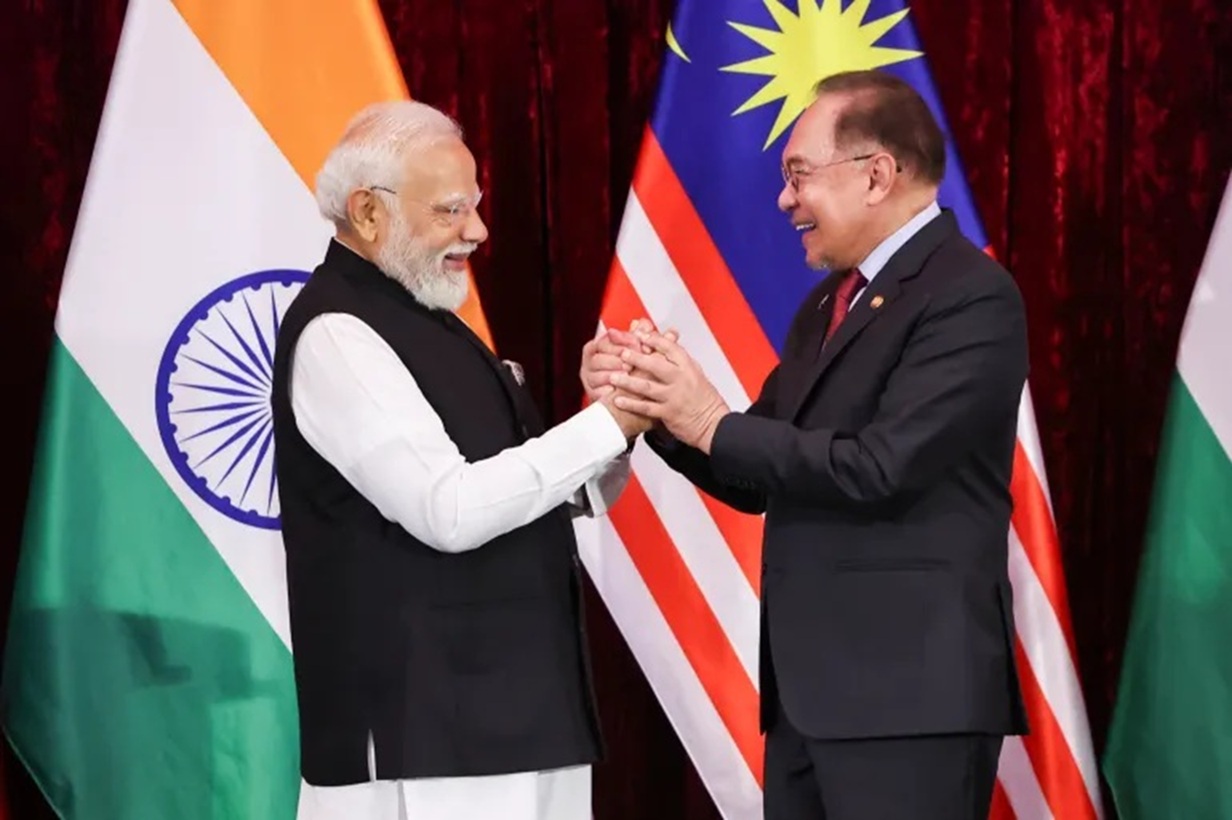Neom is an urban area being built by Saudi Arabia in Tabuk Province, launched in 2017 by Crown Prince Mohammad bin Salman. Low funds, high risk and China-US strategic rivalry have forced Saudi to defer Project NEOM.
In August, Saudi Arabia’s sovereign Public Investment Fund signed six agreements worth US$ 50 billion with Chinese firms to encourage capital flows. These MOUs are part of Saudi’s efforts to raise foreign investment for its Neom megacity project. This development came after China Railway Construction Corporation (CRCC) completed and delivered a horizontal tunnel project for NEOM in mid-May – the first Chinese project in NEOM.
Launched in 2017, NEOM is the crown jewel of Saudi Prince Mohammad bin Salman’s Vision 2030. Envisioned as a US$ 500 billion high-tech development along the Red Sea coast, NEOM is a game-changer for Saudi Arabia, diversifying its economy beyond oil and projecting the country’s soft power.
In April this year, Saudi Arabia revised its target for The Line – a unique linear city inside NEOM which has received global attention for its avant-garde architecture and a revolutionary concept of carbon-neutral urban living. The kingdom announced a massive scaling down in the size of the metropolis from 105 to 1.5 miles along with a decrease in likely inhabitants to 300,000 from an original target of 1.5 million. The rationalization was made because of the serious fund crunch. As of September 2022 (the most recent statistics available), cash reserves in the Saudi sovereign wealth fund had dropped to US$ 15 billion, putting the project under pressure. By 2025, the sovereign fund’s annual spending is likely to surpass US$ 70 bn, up from its current range of US$ 40 to US$ 50 billion.
What are Saudi’s options?
According to a statement made by MBS in 2022, the initial phase of Neom would require 1.2 trillion riyals (US $320 billion) by 2030. The PIF, chaired by the de facto ruler, would provide half of that amount, and the remaining half would be funded through private sector investment and foreign investment.
On June 2 this year, the Saudi government announced the sale of a 0.64% stake in the state-owned oil giant ARAMCO to generate approximately US$ 12 billion, which will go towards the Public Investment Fund. Later this year, Saudi Arabia plans to launch the first-ever riyal bond sale to earn about 5 billion riyals to finance its building projects. The corporation has designated institutions including HSBC Holdings and the securities divisions of Al Rajhi Bank and Saudi National Bank to coordinate the sale of Islamic bonds.
The regime acknowledged the need to invite foreign investments into NEOM from early on and the first effort in the direction of NEOM diplomacy was made during King Salman’s first official visit to Moscow in October 2017. During the visit, Russia’s Direct Investment Fund (RDIF) offered to invest billion of dollars into Neom and the same was reiterated by RDIF’s CEO Kirill Dmitriev during his visit to the Saudi kingdom in 2019. However, nothing materialized. Thereafter, Riyadh started looking towards the West and the Asian subcontinent for investments. On the sidelines of the G20 summit 2020 in New Delhi, Saudi’s Ministry of Media organised a three-day exhibition called Media Oasis to showcase NEOM’s futuristic vision to all G20 member countries.
In 2020, NEOM signed two important Joint Venture (JV) deals; first with London-based Solar Water plc for developing carbon-neutral hydro-infrastructure and fresh water supply to the megacity; second with US-based Air Products and ACWA Power to create a green hydrogen-based ammonia production facility powered by renewable energy. Since then, many international firms and start-ups have entered JVs with NEOM. Prominent deals include London-based communications company One Web; German aircraft manufacturer Volocopter; Poland-based construction tech startup AI Clearing; China- and US-based self-driving car startup Pony.ai; and Sweden-based Candela.
In November 2023, NEOM opened its first international branch in London to coordinate its Europe operations and in April this year, NEOM opened its first US office in New York City as a base for its business across North America. Even though the Saudi regime has been trying proactively to boost foreign direct investment from potential investors across the world, its efforts have had little success.
An important concern in this regard is persistent instability in the region. Higher predicted volatilities and weaker market returns have been linked to increased geopolitical risk. The majority of foreign investors have been reluctant to commit funds to long-term projects in Saudi Arabia because of the perceived risk and the current volatility in the region. Even if the direct security threat to NEOM is minimal, the geopolitical instability in the Middle East can deter investors from committing substantial resources to a long-term venture. In the face of limited options, Riyadh would naturally gravitate towards those countries who are willing to invest more funds and capital.
Israel factor: Known for its technological advancement and its vibrant startup culture, Israel was positioned to be a major partner in Saudi Arabia’s Vision 2030. Riyadh and Tel Aviv were inching closer to each other with USA’s blessings and diplomatic normalization was underway, explained Amb. Anil Trigunayat (Retd), Middle East expert and India’s former envoy to Jordan. In November 2020, Saudi Crown Prince MBS is believed to have hosted Israeli PM Benjamin Netanyahu alongside U.S. Secretary of State Mike Pompeo in NEOM.
In 2022, Riyadh opened the previously-closed Saudi air space to and from Israel allowing flights to operate, thereby enabling Israeli businesspeople to visit the country. In September 2023, one month before the Hamas attack, an Israeli business delegation travelled to Saudi Arabia to attend a large-scale business conference in Dammam.
Riyadh and Tel Aviv were all set to make their relationship public. However, the October 7 Hamas attack postponed the prospects of any full-scale diplomatic or economic normalization. Saudi Arabia’s designation as the revered leader of the Islamic world and guardian of the two Holy mosques makes any formal normalization of relations with the Jewish state highly unlikely. With multiple financial hiccups deferring the progress of NEOM, MBS cannot wait for the dust to settle in Gaza.
Riyadh-Beijing NEOM diplomacy and US concerns: Saudi Arabia is now looking eastwards and is trying to raise funds from its important economic partner – China. In April this year, NEOM organised a series of grand exhibitions in Beijing, Shanghai, and Hong Kong to attract investors. The same month, Saudi’s Public Investment Fund-subsidiary Alat entered a US$ 200 million deal with US-sanctioned surveillance firm Dahua Technology to manufacture surveillance hardware for NEOM. Meanwhile, in July, two more Chinese firms got abroad: JinkoSolar signed a contract with India’s Larsen & Toubro (L&T) to supply solar PV modules for the NEOM green hydrogen project and China Harbour Engineering Arabia also won a construction contract for the port of NEOM’s Oxagon in partnership with an Egyptian and Saudi firm.
Despite US suspicions and discomfort with China’s expanding footprints across NEOM, Riyadh is eyeing Chinese funds in a big way. Moreover, there is a general perception in the Middle East that US has become disinterested in the region and thus most countries including Saudi Arabia have adopted an Act East Policy, explained Amb. Trigunayat. Saudi Arabia is already China’s largest economic partner in the Middle East as well as the country’s top global supplier of crude oil. The Chinese footprint in NEOM city has added a new urgency to the USA’s NEOM diplomacy.
In May this year, the U.S. Foreign Commercial Service decided to organise an infrastructure working group to facilitate networking for American parties interested in collaborating with NEOM… The International Trade Association under the US Department of Commerce has also invited interested private investors and companies to register. Even though the US government via NEOM’s Manhattan branch is spearheading American investments, it is important for the government to find a way to compensate for the high-risk factor and offer special incentives to the interested parties for long-term investments. To convince Riyadh to limit its engagement with China, Washington needs to make a better and more lucrative deal with the Saudis.
Article Courtesy: Eurasia Review (Oregon, USA). The original article can be accessed at this link.
Disclaimer: The views and opinions expressed by the author do not necessarily reflect the views of the Government of India and Defence Research and Studies
Title image courtesy: ttps://saudileaks.org







